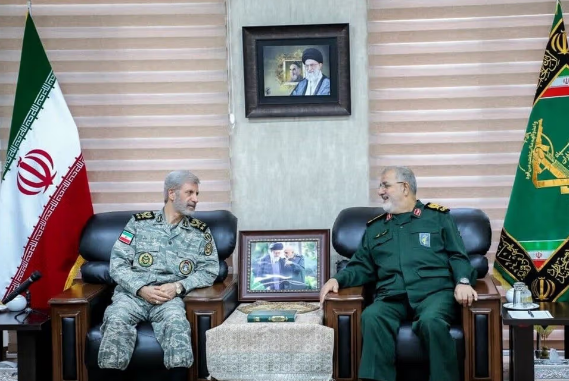
Iran’s Army and Revolutionary Guards’ chiefs meet on July 17, 2025.
| Published July 17, 2025
Tensions across the Middle East are once again approaching a boiling point as senior Iranian officials issue stark new warnings to Israel, signaling the Islamic Republic’s readiness for renewed confrontation. In the wake of the June conflict—one of the most direct exchanges between the two nations in recent history—Iran’s military leaders, political elite, and Supreme Leader have presented a united front, vowing to retaliate “strongly and decisively” against any future aggression. These declarations come amid growing international concern that another miscalculation could ignite a broader regional war, with global implications. As both diplomacy and deterrence hang in the balance, Tehran’s message is clear: it is prepared for war if provoked.
🇮🇷 Confrontation Renewed: Iran’s Military Posture & Regional Signals
1. Senior Iranian officials issue stark warnings
During a high‑profile ceremony, senior Iranian figures strongly warned Israel against further aggression, highlighting ongoing coordination among Iran’s armed forces. They emphasized that any repeat of aggression would be met with decisive retaliation— a message clearly aimed at deterring further strikes .
2. Army & IRGC leaders reinforce readiness
On July 17, top commanders from both the Iranian Army and the IRGC publicly declared they remain prepared for another round of conflict:
-
Major Gen. Pakpour (IRGC) praised public resistance and warned of continuing strikes from “the exact point where it stopped.”
-
Maj. Gen. Hatami (Army) reiterated their unity and readiness, framing the Israeli regime as a persistent threat to regional stability.
3. Supreme Leader’s broader vow of response
Ayatollah Khamenei reinforced this posture, stating Iran is “fully prepared to respond to any new attack”—and that responses could be “more severe” than previously seen during the June conflict.
4. Defense chief echoes threats
Iran’s defense minister joined the chorus, declaring that both the Army and IRGC stand united as a “divine army,” and will vigorously defend Iran’s honor and security—a message affirming long-term commitment to this hardline stance.
🛰️ Context: The June War & Strategic Landscape
-
On June 13, Israel launched airstrikes on Iran’s nuclear and military facilities, marking an escalation unprecedented in scale. Iran responded with multiple missile and drone salvos, some directed at Israel and U.S. bases in Qatar.
-
June 22, U.S. forces struck further Iranian facilities, triggering new reprisals and deepening divisions between Iranian hardliners and pragmatists who favor diplomacy.
 Implications:
Implications:
🔥 1. Risk of Escalation in the Middle East
Iran’s unified military messaging signals a readiness to engage in another direct conflict with Israel. Any future Israeli strike—real or perceived—could trigger immediate and large-scale retaliation. With both sides on high alert, even minor incidents could spiral into a wider regional confrontation involving U.S. assets, Gulf nations, and proxy forces.
🛡️ 2. Strengthened Position of Iran’s Hardliners
The public declarations by Iran’s armed forces and senior officials may bolster the influence of hardline factions within Iran’s political structure. This could weaken President Masoud Pezeshkian’s efforts at pursuing diplomacy or reviving the nuclear deal, as national security becomes the dominant priority over reform or engagement.
🌍 3. Diplomatic and Strategic Repercussions for Global Powers
International actors—including the U.S., EU, Russia, and China—are now navigating a more volatile environment. Iran’s insistence on a robust military response limits diplomatic room for maneuver and increases the urgency for backchannel negotiations to prevent war. The effectiveness of Western deterrence, sanctions, and containment strategies will be tested.
🛰️ 4. Intensified Proxy Conflict Across the Region
Iran’s assertiveness may embolden regional proxies such as Hezbollah in Lebanon, Shiite militias in Iraq and Syria, and the Houthis in Yemen. This could result in a multi-front challenge to Israeli and U.S. interests in the region, escalating tensions in areas already strained by conflict and instability.
💹 5. Economic Instability and Energy Security
With the Strait of Hormuz once again under indirect threat, global energy markets remain sensitive to further Iranian escalation. Prolonged tensions may cause oil prices to spike and shipping routes to reroute—affecting economies well beyond the Middle East.
 Overall Takeaway:
Overall Takeaway:
As Iran doubles down on its military posture and issues sharp warnings to Israel, the region faces a precarious moment. With both rhetoric and readiness escalating, the margin for error narrows by the day. Tehran’s top officials—from military commanders to the Supreme Leader—have made it clear: any perceived aggression will be met with force. While calls for diplomacy persist, they are being drowned out by the drumbeat of deterrence. Whether this leads to renewed conflict or a fragile standstill will depend on the next moves made not just in Tehran or Tel Aviv, but in Washington, Brussels, and beyond. In a region defined by volatility, the only certainty now is uncertainty.





Be the first to comment